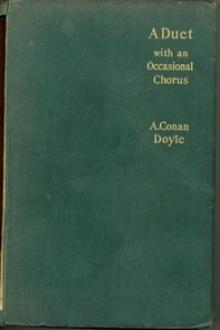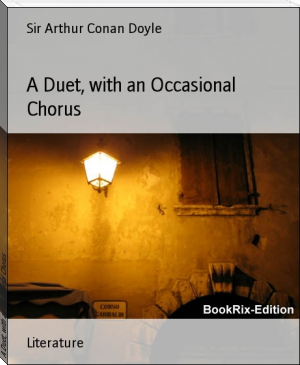A Duet (with an occasional chorus) - Arthur Conan Doyle (best classic books to read TXT) 📗

- Author: Arthur Conan Doyle
- Performer: -
Book online «A Duet (with an occasional chorus) - Arthur Conan Doyle (best classic books to read TXT) 📗». Author Arthur Conan Doyle
Fancy your imagining that you had come into my life in order to darken it. Why, you ARE my life. If you went out of it, what would be left? You talk about my happiness before I met you—but oh, how empty it all was! I read, and played, and sang as you say, but what a void there was! I did it to please mother, but there really seemed no very clear reason why I should continue to do it. Then you came, and everything was changed. I read because you are fond of reading and because I wanted to talk about books with you. I played because you are fond of music. I sang in the hope that it might please you. Whatever I did, you were always in my mind. I tried and tried to become a better and nobler woman, because I wanted to be worthy of the love you bore me. I have changed, and developed, and improved more in the last three months than in all my life before. And then you come and tell me that you have darkened my life. You know better now. My life has become full and rich, for Love fills my life. It is the keynote of my nature, the foundation, the motive power. It inspires me to make the most of any gift or talent that I have. How could I tell you all this if I did not know that your own feeling was as deep. I could not have given the one, great, and only love of my life in exchange for a half-hearted affection from you. But you will never again make the mistake of supposing that any material consideration can affect our love.
And now we won’t be serious any longer. Dear mother was very much astounded by your tumultuous midnight arrival, and equally precipitate departure next morning. Dear old boy, it was so nice of you! But you won’t ever have horrid black humours and think miserable things any more, will you? But if you must have dark days, now is your time, for I can’t possibly permit any after the 30th.— Ever your own
MAUDE.
Woking, June 11th.
My Own Dearest Girlie,—How perfectly sweet you are! I read and re-read your letter, and I understand more and more how infinitely your nature is above mine. And your conception of love—how lofty and unselfish it is! How could I lower it by thinking that any worldly thing could be weighed for an instant against it! And yet it was just my jealous love for you, and my keenness that you should never be the worse through me, which led me to write in that way, so I will not blame myself too much. I am really glad that the cloud came, for the sunshine is so much brighter afterwards. And I seem to know you so much better, and to see so much more deeply into your nature. I knew that my own passion for you was the very essence of my soul—oh, how hard it is to put the extreme of emotion into the terms of human speech!—but I did not dare to hope that your feelings were as deep. I hardly ventured to tell even you how I really felt. Somehow, in these days of lawn-tennis and afternoon tea, a strong strong passion, such a passion as one reads of in books and poems, seems out of place. I thought that it would surprise, even frighten you, perhaps, if I were to tell you all that I felt. And now you have written me two letters, which contain all that I should have said if I had spoken from my heart. It is all my own inmost thought, and there is not a feeling that I do not share. O Maude, I may write lightly and speak lightly, perhaps, sometimes, but there never was a woman, never, never in all the story of the world, who was loved more passionately than you are loved by me. Come what may, while the world lasts and the breath of life is between my lips, you are the one woman to me. If we are together, I care nothing for what the future may bring. If we are not together, all the world cannot fill the void.
You say that I have given an impulse to your life: that you read more, study more, take a keener interest in everything. You could not possibly have said a thing which could have given me more pleasure than that. It is splendid! It justifies me in aspiring to you. It satisfies my conscience over everything which I have done. It must be right if that is the effect. I have felt so happy and light-hearted ever since you said it. It is rather absurd to think that I should improve you, but if you in your sweet frankness say that it is so, why, I can only marvel and rejoice.
But you must not study and work too hard. You say that you do it to please me, but that would not please me. I’ll tell you an anecdote as a dreadful example. I had a friend who was a great lover of Eastern literature, Sanskrit, and so on. He loved a lady. The lady to please him worked hard at these subjects also. In a month she had shattered her nervous system, and will perhaps never be the same again. It was impossible. She was not meant for it, and yet she made herself a martyr over it. I don’t mean by this parable that it will be a strain upon your intellect to keep up with mine. But I do mean that a woman’s mind is DIFFERENT from a man’s. A dainty rapier is a finer thing than a hatchet, but it is not adapted for cutting down trees all the same.
Rupton Hale, the architect, one of the few friends I have down here, has some most deplorable views about women. I played a round of the Byfleet Golf Links with him upon Wednesday afternoon, and we discussed the question of women’s intellects. He would have it that they have never a light of their own, but are always the reflectors of some other light which you cannot see. He would allow that they were extraordinarily quick in assimilating another person’s views, but that was all. I quoted some very shrewd remarks which a lady had made to me at dinner. ‘Those are the traces of the last man,’ said he. According to his preposterous theory, you could in conversation with a woman reconstruct the last man who had made an impression to her. ‘She will reflect you upon the next person she talks to,’ said he. It was ungallant, but it was ingenious.
Dearest sweetheart, before I stop, let me tell you that if I have brought any happiness into your life, you have brought far, far more into mine. My soul seemed to come into full being upon the day when I loved you. It was so small, and cramped, and selfish, before—and life was so hard, and stupid, and purposeless. To live, to sleep, to eat, for some years, and then to die—it was so trivial and so material. But now the narrow walls seem in an instant to have fallen, and a boundless horizon stretches around me. And everything appears beautiful. London Bridge, King William Street, Abchurch Lane, the narrow stair, the office with the almanacs and the shining desks, it has all become glorified, tinged with a golden haze. I am stronger: I step out briskly and breathe more deeply. And I am a better man too. God knows there was room for it. But I do try to make an ideal, and to live up to it. I feel such a fraud when I think of being put upon a pedestal by you, when some little hole where I am out of sight is my true place. I am like the man in Browning who mourned over the spots upon his ‘speckled hide,’ but rejoiced in the swansdown of his lady. And so, my own dear sweet little swansdown lady, good-night to you, with my heart’s love now and for ever from your true lover,
FRANK.
Saturday! Saturday! Saturday! oh, how I am longing for Saturday, when I shall see you again! We will go on Sunday and hear the banns together.
St. Albans, June 14th.
Dearest Frank,—What a dreadful thing it is to have your name shouted out in public! And what a voice the man had! He simply bellowed ‘Maude Selby of this parish’ as if he meant all this parish to know about it. And then he let you off so easily. I suppose he thought that there was no local interest in Frank Crosse of Woking. But when he looked round expectantly, after asking whether there was any known cause or just impediment why we should not be joined together, it gave me quite a thrill. I felt as if some one would jump up like a Jack-in-the-box and make a scene in the church. How relieved I was when he changed the subject! I sank my face in my hands, but I know that I was blushing all down my neck. Then I looked at you between my fingers, and there you were sitting quite cool and cheerful, as if you rather liked it. I think that we shall go to evening-service next week. Papa has given up going altogether since the new organist came. He says he cannot face the music.
What a sweet time we had together. I shall never, never forget it! O Frank, how good you are to me! And how I hope you won’t regret what you are doing. It is all very well just now, when I am young and you think that I am pretty. I love that you should think so, but I am compelled to tell you that it is not really so. I can’t imagine how you came to think it! I suppose it was from seeing me so often beside papa. If you saw me near Nelly Sheridan, or any other REALLY pretty girl, you would at once see the difference. It just happens that you like grey eyes and brown hair, and the other things, but that does not mean that I am really pretty. I should be so sorry if there were any misunderstanding about this, and you only found out when too late. You ought to keep this letter for reference, as papa always says, and then it will be interesting to you afterwards.
I should like you to see me now—or rather I wouldn’t have you see me for the world. I am so flushed and untidy, for I have been cooking. Is it not absurd, if you come to think of it, that we girls should be taught the irregular French verbs, and the geography of China, and never to cook the simplest thing? It really does seem ridiculous.
But it is never too late to mend,





Comments (0)